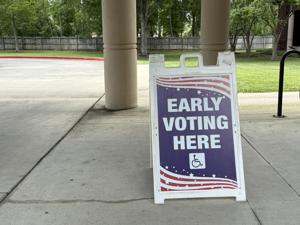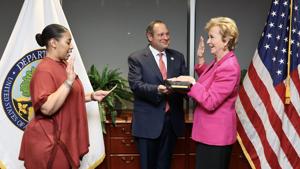(The Center Square) – Florida Attorney General Ashley Moody is leading a 20-state coalition opposing a Treasury Department claim that state laws preventing de-banking policies are a “national security threat.” The latest action is only an “attempt to stoke confusion about state laws to advance extreme activist agendas,” Moody said.
“The Biden-Harris administration has pushed a radical agenda since its first day in office,” Moody said. “From open borders, to attacking gas stoves and washing machines, they now are attempting to use the power of the Treasury Department to accuse states, that seek to protect their citizens from unjustified radical de-banking, of being a national security threat. This is nothing more than another attempt to leverage the power of the federal government to achieve this administration’s destabilizing, activist agenda.”
In a letter to Yellen, the coalition expressed their “serious objections to your department’s recent letter characterizing state laws attempting to protect individuals from de-banking as harmful to national security.”
At issue is a request from U.S. Rep. Josh Gottheimer, D-NJ, who argues state laws are “fracturing the national banking system” and “may conflict with federal laws intended to combat money laundering and terrorist financing.” His letter doesn’t mention ESG policies but questions “when states enact laws that subject banks to processes and disclosure requirements that are at cross-purposes with federal law, SAR confidentiality could be jeopardized,” referring to federal law requiring banks to file suspicious activity reports.
No state laws prohibit banks from filing SARs or from complying with the Bank Secrecy Act.
Last month, Gottheimer expressed concerns to Treasury Secretary Janet Yellen at a U.S. House Committee on Financial Services hearing about “recent state laws that require banks to provide an explanation with specific reasons for closing or denying an account including situations where the decision was related to financial crimes risk.” He was concerned they “may conflict with federal requirements, especially the obligations that banks have under the federal anti-money laundering laws, that prevent terrorists and illicit financing in the US financial systems.”
In response, Yellen said banks are required to file SARs and comply with federal law. Treasury Under Secretary for Terrorism and Financial Intelligence Brian Nelson then sent a letter to Gottheimer saying they shared his concerns.
“State laws interfering with financial institutions’ ability to comply with national security requirements heighten the risk that international drug traffickers, transnational organized criminals, terrorists, and corrupt foreign officials will use the U.S. financial system to launder money, evade sanctions, and threaten our national security,” Nelson wrote, referring to a newly enacted Florida law, HB 989.
Nelson claims HB 989 “defines as an ‘unsafe and unsound practice’ a financial institution’s reliance on any factor that is ‘not a quantitative … standard’ to determine which customers to serve or services to offer” and “prohibits consideration of a person’s ‘affiliations’ or ‘business sector’ to make these decisions.”
An AP “Climate Desk” initiative claims the Florida law bans Environmental, Social, Governance policies. According to the bill language, it was filed to prohibit financial institutions from discriminating against customers based on their religious and political views and from creating a social credit score system to restrict or penalize their purchases or access to credit because of them.
The law protects “consumers from discrimination and entities like religious organizations, gun manufacturers, and those engaged in fossil fuel exploration from improper political pressure for their lawful and often constitutionally protected activities,” Moody said. “No consumer or business should be denied services based on political beliefs or religious views or because of some arbitrary social credit score derived from ideological agendas.”
Nelson’s letter “deliberately misleads financial institutions,” Moody argues, “by falsely suggesting” that HB 989 prohibits them from considering whether a consumer is associated with designated terrorist groups. It was passed to ensure “that financial institutions focus on true risk-based factors and stay out of the business of forcing radical social policies,” she said. Claiming “that prohibiting discrimination will harm national security” is “outlandish.”
Florida already prohibits state pension money from being invested in funds that advance ESG policies. Gov. Ron DeSantis has taken executive action on the issue for several years. Last year, he led a coalition of 18 governors to fight the Biden-Harris ESG agenda; 25 state attorneys general also sued to block a federal ESG plan they argue could jeopardize the retirement savings of two-thirds of the U.S. population.
The Treasury “has once again forsaken its statutory role and instead chosen to intervene on behalf of activists seeking to hijack the financial system for their political ends,” the coalition argues. “It is even more disappointing that the Treasury Department would use ‘national security’ as cover for large banks’ abuse of power to achieve those ends.”
Joining Moody are attorneys general from Alabama, Alaska, Arkansas, Idaho, Indiana, Iowa, Kansas, Louisiana, Mississippi, Missouri, Montana, Nebraska, New Hampshire, North Dakota, South Carolina, Texas, Utah, West Virginia and Wyoming.














































